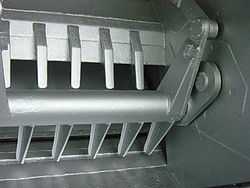Revopak

The Revopak is a type of waste collection vehicle manufactured by the British company Shelvoke and Drewry.
Introduced in 1971, the Revopak was in fact a British-built clone of a French Bennes-Ray Superpac. It was among one of the first vehicles to address the problem of compacting and destroying the high content of packaging materials now found in domestic refuse.
By using a huge, hydraulic-powered rotating rake with large steel tines, refuse was scooped up from the loading hopper and forced through a set of stationary tines. The continuous rotation of the rake progressively mangled, mutilated and compacted the refuse so as to reduce the space required to dump it at the landfill site.
Two generations of the Revopak were produced - the early 1971-1973 models used hydraulic motors which drove the compaction rake by means of chains, while the later models utilised a simpler and more robust drive system which consisted of twin synchronised hydraulic rams to operate the compaction system. Many variations were made of the basic design, including a multitude of different body lengths and payloads, plus SD developed bin lifters as an optional extra - a precursor to the modern wheeled bin collection systems of today. One disadvantage of the system was heavier fuel consumption, since the compaction system has to run continuously in order to be effective.
The Revopak was in continuous production until 1990, when SD went out of business, although the French built unit is still manufactured by SEMAT.